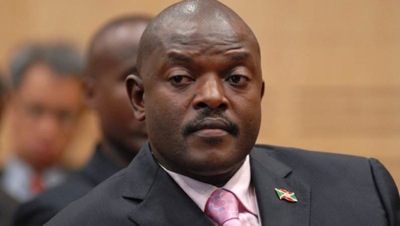Pierre Nkurunziza
[Black Star News Editorial]
Just a few weeks ago Africans throughout the continent and around the world celebrated when Nigeria’s President Goodluck Jonathan quickly conceded election defeat to challenger Muhammadu Buhari.
Political maturity had arrived on the continent it seemed.
Today, many Africans are watching with alarm as things seem to be spiraling out of control in Burundi, the ethnically volatile east-central African country with a troubled past and history dominated by inter-ethnic massacres. A former chief of intelligence has just announced a coup against President Pierre Nkurunziza, who is seeking a third presidential term. The constitution mandates two-term limits.
Nkurunziza, who is attending a regional meeting on Burundi’s crisis in neighboring Tanzania claims the coup attempt failed and that loyalist troops are searching for the officers behind it.
Nkurunziza has been in office since 2005, which is 10 years. Nkurunziza has argued, and his courts agree with him, that his first five-year presidential term should not be counted towards the term limits. He says for the first term he had been elected by the country’s parliament following the Arusha Peace agreement that ended years of bloody inter-ethnic conflict between the minority ethnic Tutsis and Burundi’s majority ethnic Hutus, to which Nkurunziza belongs.
Yet many Burundians don’t agree with President Nkurunziza’s position. They contend that “two terms means two terms.” There have been daily protests by civilians in the streets. As many as 15 people have been killed by the security forces. Enraged civilians have now started attacking the police.
The demonstrators, in addition to possibly being inspired by the on-going transition in Nigeria must recall how protests in Burkina Faso drove Blaise Compaore from power last year when he tried to extend his presidential term.
The Burundi crisis took a drastic turn today with the announcement by the former Burundi intelligence chief, Gen. Godefroid Niyombareh, dismissed a few months ago, that he and other officers had deposed Nkurunziza. He called on civil society leaders in Burundi to join him in a transitional government until elections are held.
Nkurunziza, who is meeting with the leaders of Tanzania, Rwanda, Uganda, and Kenya claims the coup attempt has failed.
Ironically, some of the leaders involved in mediating the Burundi crises are themselves power-hungry rulers who have been in power for many years by rigging elections.
They include Uganda’s Gen. Yoweri Museveni, who has been in office since 1986 and scrapped the constitutionally mandated two-terms in 2005 and who recently apparently spun a tale claiming the United Nations wanted him to “intervene” in Burundi, and; Rwanda’s Gen. Paul Kagame, who has held power since 1994, and whom many believe will extend his rule beyond the constitutional limit in 2017.
At least Kenya and Tanzania have respected constitutions with presidential term limits.
But all eyes are now on Burundi.
Notwithstanding the outcome of today’s purported coup or coup attempt — which is something that can’t be endorsed since the action is unconstitutional, the very transgression Nkurunziza’s opponents accuse him of; and it’s also dangerous in an ethnically volatile country like Burundi — the president must rethink seriously whether the cost of a third term is worth it.
Political tension and instability seem guaranteed if President Nkurunziza insists on maintaining a line on the sand.
The leaders of Rwanda are also looking for an excuse for military intervention in Burundi. Rwanda is governed by an ethic Tutsi politico-military elite that’s monopolized power and political space under autocrat Kagame; anyone who criticizes the generalissimo is accused of being a “genocide denier.”
There have been media reports about threats against Tutsis in Burundi from the security forces. Rwanda could use this as an excuse: it has in the past used the argument to rationalize numerous military invasions of the Democratic Republic of Congo, when in fact many of the incursions were designed to plunder Congo’s vast mineral wealth.
Nkurunziza, a former guerrilla leader who knows about the pains of conflict, must weigh all these variables.
Peace and stability in Burundi and its sovereignty are paramount.





